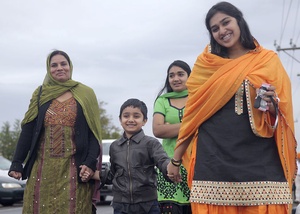 This picture was taken during the famous Sikh Festival and Parade in Yuba City, where this family was seen enjoying the festivities. Photo donated by an anonymous contributor.The Punjabi-American community in Sutter County is one of the largest outside the Punjab state of India. It is most concentrated in South Yuba City (where 20.2% of residents are Asian Indian, predominantly Punjabi), followed by Live Oak (7.8%), Tierra Buena (7.8%), and Yuba City (6.4%). Punjabi farmers began settling in the area around 1910. From 1913 to 1952, the Alien Land Law prevented them from owning land in California. Some of them found American "front men" to hold their land for them, or placed their land under the legal ownership of their American-born children.
This picture was taken during the famous Sikh Festival and Parade in Yuba City, where this family was seen enjoying the festivities. Photo donated by an anonymous contributor.The Punjabi-American community in Sutter County is one of the largest outside the Punjab state of India. It is most concentrated in South Yuba City (where 20.2% of residents are Asian Indian, predominantly Punjabi), followed by Live Oak (7.8%), Tierra Buena (7.8%), and Yuba City (6.4%). Punjabi farmers began settling in the area around 1910. From 1913 to 1952, the Alien Land Law prevented them from owning land in California. Some of them found American "front men" to hold their land for them, or placed their land under the legal ownership of their American-born children.
Immigration laws at the beginning of the 20th century made it much easier for Punjabi men (who were valued as physical laborers) than for Punjabi women or children to enter the United States. As a result, many Punjabi farmers left their families behind in India, intending to spend only a few years earning money in California before returning home to their families. When they found themselves becoming more successful in their new home than they had expected, they began wanting to bring their families to California to live here permanently, but they soon found that it was impossible for their wives and children to gain entry to the United States. This caused considerable heartbreak, and many immigrant men remained here alone, often living in large, all-male groups in dormitory-style bunkhouses. Laws prohibiting interracial marriage punished Punjabi men who married white women. Marriages between Punjabi men and Mexican-American women were also officially banned, but these were frequently not punished, with authorities listing the couples' races on their marriage registry as simply "brown" so that the marriages appeared not to be interracial.1
The vast majority of the Punjabi immigrants at this time—about 90%—were Sikhs, although only 13% of the population in the Punjab state of India was Sikh. The Muslim majority in Punjab was not as motivated to emigrate, nor was the larger Hindu minority, which comprised 30% of the population in Punjab but almost none of the immigrant population in California. However, newspapers and the general public in California routinely described the Punjabi-American immigrants as "Hindus." India as a country was sometimes referred to as Hindustan, and all the members of its population were therefore called Hindus for short. However, the fact that this name is associated with the followers of the Hindu religion caused considerable misunderstanding about the religion of the vast majority of the immigrants.
Marysville, Live Oak, Wheatland, and Nicolaus used to be sundown towns (towns in which people of color were threatened with violence if they attempted to live in the city or to remain in it after sundown). After the Bellingham riots (when a mob of several hundred European-American racists attacked Indian-Americans in Bellingham, Washington, in September 1907), similar events occurred here in Live Oak. On Saturday, January 25, 1908, approximately 20 European-American residents attacked two houses in Live Oak in which 70 Indian-Americans recently laid off by the Southern Pacific Company were living. The European-Americans stole $1,950 from their victims and drove them to the edge of town, ordering them never to return.2
The case of United States v. Bhagat Singh Thind in 1923 retroactively stripped many Punjabi-American naturalized citizens of their American citizenship, on the grounds that they were ruled not to be "white" even though they were "Caucasian." Under the laws of the time, losing their American citizenship also caused them to be retroactively stripped of their right to own land. Many land-owning Punjabi-American immigrants lost their lands at this time.
After the Immigration Act of 1917 and the Immigration Act of 1924, it was almost impossible to legally immigrate to the United States from India. Some Indians did manage to immigrate illegally during these years, usually traveling to Panama and crossing the Mexican border. After the Luce-Celler Act of 1946 and the Hart-Celler Act of 1965 eased the immigration restrictions, immigration gradually increased again.
Events
May: Punjabi American Festival November: Sikh Festival and Parade
Places
Places to Eat
Places to Shop
- Bombay Video
- Dhami's Mini Mart
- Halal Market and Deli
- Kashmir Bazaar
- New Delhi Palace
- Punjab Bazaar
- Raj's Mini Mart
- Sari Palace
Places to Worship
Links
Echoes of Freedom: South Asian Pioneers in California, 1899-1965 Yuba City—A Mini Punjab In California
Footnotes
1. Echoes of Freedom: South Asian Pioneers in California, 1899-1965, Chapter 9, from the University of California, Berkeley
2. Echoes of Freedom: South Asian Pioneers in California, 1899-1965, Chapter 4, from the University of California, Berkeley.


